PLOT: In the early 80s in New York City, a white Jewish student, Paul (Banks Repeta), befriends a black student, Jimmy (Jaylin Webb). When the two are caught smoking marijuana, Paul’s parents (Jeremy Strong & Anne Hathaway) send him to an elite private school, driving a wedge between him and his friend that he’s too naive to recognize.
REVIEW: James Gray has said that Armageddon Time is essentially a biographical drama, with the main character, Banks Repeta’s Paul Graff, a stand-in for him at the same age (12-13). Like Gray, Paul is an aspiring artist, with his love of painting encouraged by his doting grandfather (Anthony Hopkins). At the same time, his upwardly mobile parents wish he’d focus on something more potentially lucrative. It has a whole lot in common with Steven Spielberg’s The Fabelmans, another autobiographical tale, but while that one is warm and affectionate, Gray’s film is full of guilt and rage and is anything but nostalgic.
Gray dares to make his stand-in, Paul, not altogether likeable. The boy is something of a brat, constantly wanting his way, but also quick to indulge in activities that, for a middle-class kid like him, is seen as mischief, but for his lower-class black friend, could have devastating consequences. In that way, Armageddon Time explores how Gray, as a boy, benefitted from a rigged system. Paul’s family is liberal and Jewish, with his plumber father swearing at the TV when he sees Reagan getting elected and his mother working on improving public school conditions via the school board. But, they’re also shown to have substantial blind spots, with them turning a blind eye to the racism around them. The defence is that they’re Jewish and used to being on the receiving end of bigotry, but they themselves are shown to indulge in the same behaviour, with both shown to be at least casually racist.
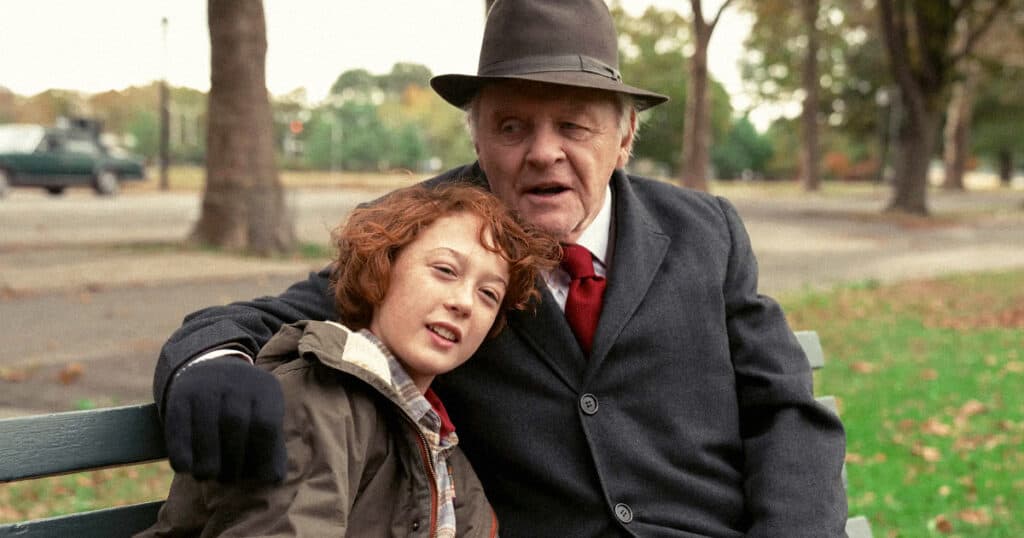
Gray’s film doesn’t let anyone off easy, mainly himself and his own family, even if everyone is layered enough to be sympathetic. As his mom, Anne Hathaway portrays a woman that dotes over her two sons and protects them but is often exasperated with them and turns a blind eye to her husband’s fits of rage. Indeed, as the family patriarch, Jeremy Strong is mostly soft-spoken but prone to insane fits of rage, terrifying his kids. Yet, at the same time, he’s very sympathetic, with him shown to love his family (even playfully dancing along to some early ska records his son brings home). While he’s abusive, he stops short of violence, making him perhaps not unlike a lot of fathers from his era. Neither parent is judged too harshly, even if both of them and Paul himself are ultimately depicted as participants in an unfair system.
The most lovable character in the movie is Anthony Hopkins as Paul’s grandfather, Aaron. He’s doting and devoted to his family, and he’s the movie’s conscience, constantly pushing Paul to do the right thing no matter the cost. He’s portrayed as wise and almost saintly, and Hopkins delivers one helluva performance. But, in an interesting twist, Gray suggests that Aaron himself is someone that also went with the flow, regardless of the cost others. Indeed he’s the one that pays for his grandson to attend a very white, privileged private school that’s run by the Trump family (Jessica Chastain plays Maryanne Trump in a cameo) and he encourages him to assimilate in some respects.
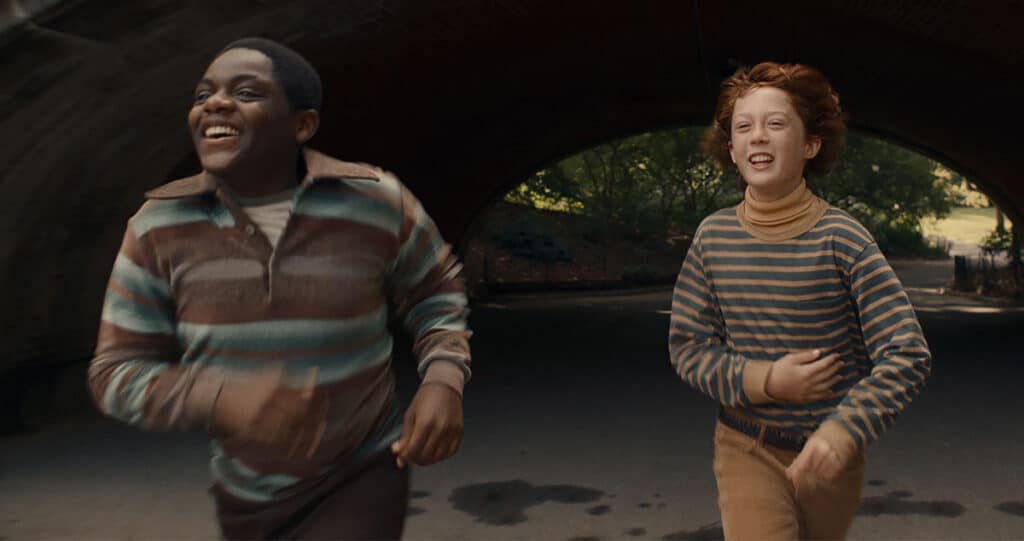
In a more straightforward, classical Hollywood movie, Paul and his family would bristle at the status quo, but Armageddon Time is more realistic. They all go with the flow, including Paul, who finds himself accepted and well-liked at the new school despite being one of the few Jewish students. His Jewishness isn’t an issue for anyone, differing from The Fabelmans in a pretty significant way. In that movie, of lot of the running time is devoted to overcoming prejudice and ignorance. By contrast, Armageddon Time suggests that once someone is assimilated (as Paul and his family are), they, in turn, become the ones that are prejudiced or at least willing to turn a blind eye. When his new friends at school mock his black friend with a racial epithet, Paul doesn’t say anything and blows off his pal in a heartbreaking scene. A child actor rarely gets to play such a three-dimensional flawed character. Repeta is excellent, with Gray not being afraid to make him someone you loathe at times, even if you’re ultimately sympathetic towards him. Jaylin Webb, as his black friend Jimmy, has a smaller arc, as you only really ever see him through Paul’s perspective. If the movie has a flaw, it’s that he seems to exist only to teach Paul a hard lesson about inequality. Still, Gray is ultimately making an autobiographical movie and stops short of depicting things he doesn’t know.
Technically, the film is as assured as anything Gray has ever done, with him evoking the period well through a well curated soundtrack (which includes The Clash song that gives the film its name). Gray also keeps the pace lively, with it running until two hours, and stopping short of going off on any tangents that could have blown out the running time. Some may bristle at the fact that the film is political in the way the Trump family is depicted, but the movie is more of a critique of the system and the way people that should know better participate than anything else. The Trumps aren’t portrayed in a cartoonish way, and Donald Trump himself isn’t depicted.
Suffice it to say, if Spielberg’s The Fabelmans is a feel-good look back at the director’s childhood, Gray’s Armageddon Time is the feel-bad version. This is par for the course for Gray, who one could never accuse of being clouded by nostalgia or the need to please. His movies are an acquired taste, but Armageddon Time is another rock-solid effort from one of the most consistent directors out there. It’s well worth checking out, even if it’s a pretty harsh ride.















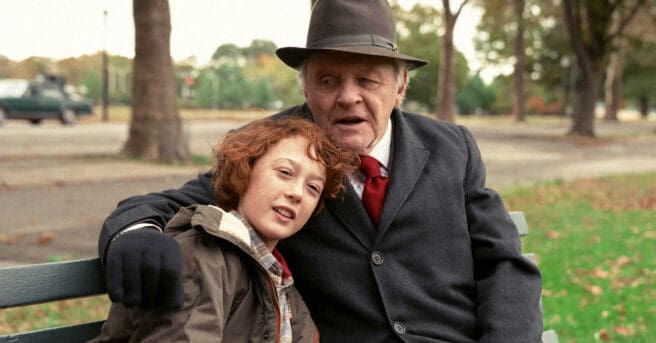





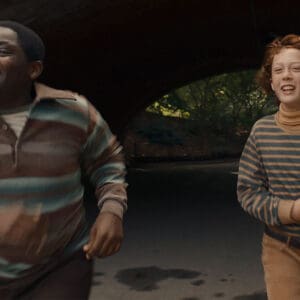

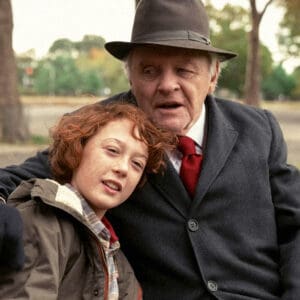

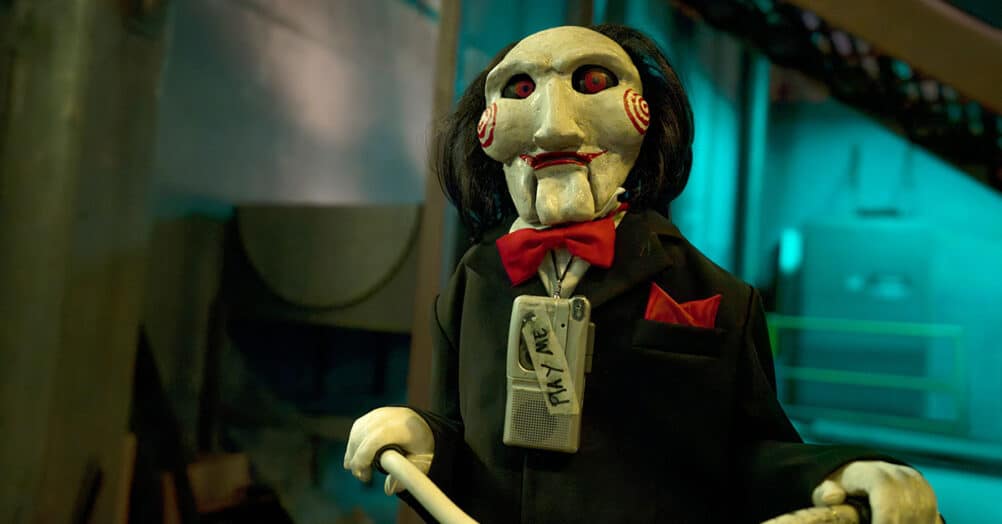









Follow the JOBLO MOVIE NETWORK
Follow us on YOUTUBE
Follow ARROW IN THE HEAD
Follow AITH on YOUTUBE